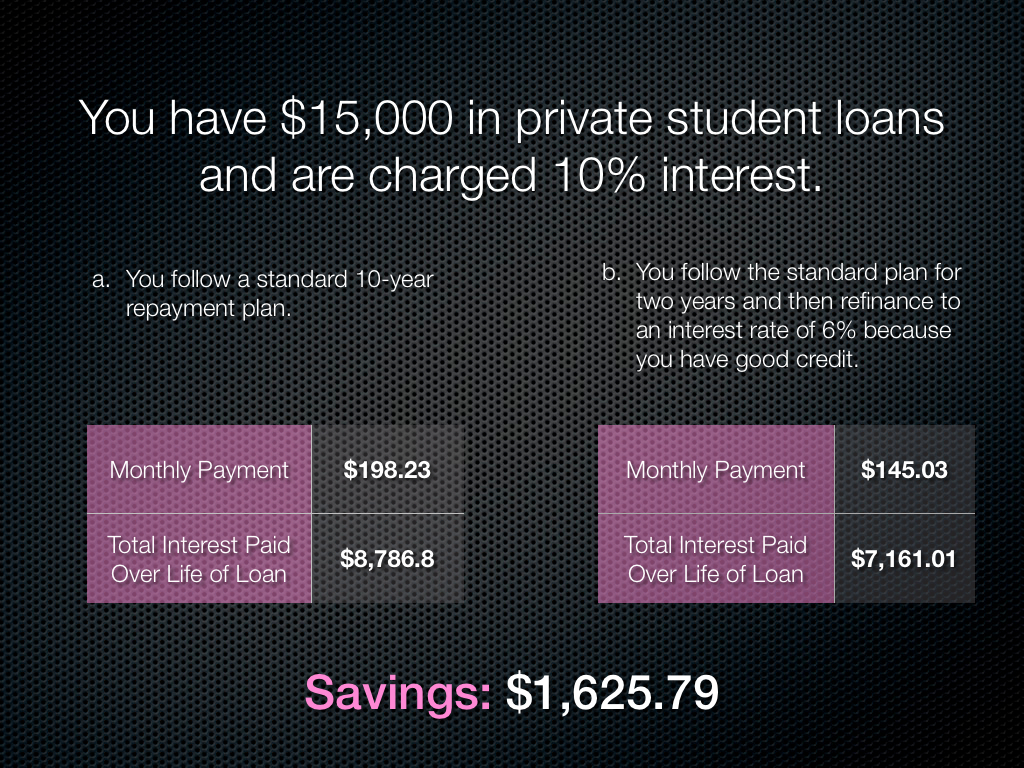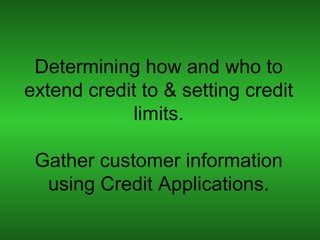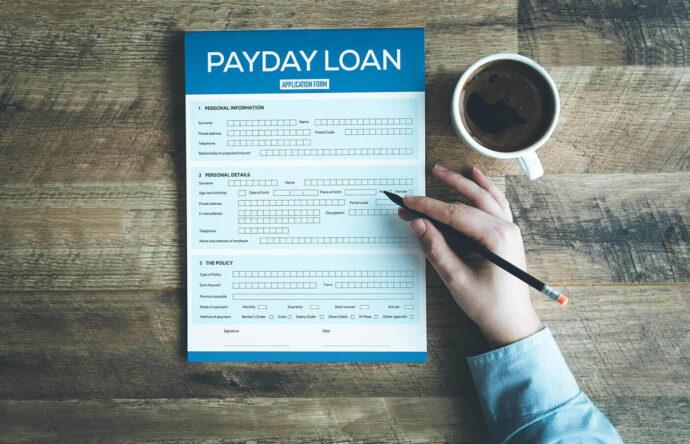
This article will describe what a Charge Off means in accounting as well as on your credit score. A charge-off refers to a negative mark placed on a debt. A charge-off stays on your report for seven years and can make it harder for you to get credit. Because it has a direct effect on your credit score, it is important to be aware of this negative mark. When you stop making payments, collection agencies will report this as a charge off.
Charge-off
A charge-off could be very damaging to your credit score. If you owe more than you can afford to pay, or if you make too few payments, you may find yourself in this position. There are ways to improve your credit score. First, you need to find out what happened in your account.
A charge-off notice informs you that your payments are late by 90 to 180 days. A chargeoff is not the equivalent of a collection. A collection agency will contact the debtor and attempt to collect it. The collection agency may continue to pursue you until the debt is paid in full or you pay it off. If you don’t pay the account in full, the collection agent can sue for a judgment.
Charge-off debt
A charge off is a writeoff of a debt. It happens when a creditor decides to cancel a debt and does not pursue collection efforts. This is a very common practice in today’s economy. This type of write-off has one simple reason: It is cheaper.

Remember that a charge-off debt can have a negative effect on your credit score and your personal life. It is therefore crucial to pay the debt off as soon as possible.
Charge-off in accounting
A charge-off, in accounting, is a debt that is uncollectible. If a debtor cannot make payment, or if the account is more then four to six month late, a lender might charge-off. This is an accounting function within the bank. It is necessary to verify that financial statements are correct and comply with accounting standards. However, it doesn't mean that the existing debt has vanished.
Charge-offs are when the business that originated the loan decides that the borrower can't be repaid. Charge-offs can occur for several reasons, including deterioration of the borrower's credit score and a prolonged period of delinquency. Businesses should account for charge offs and frequently set up an expense account.
Credit Report Charge-off
A charge-off can have serious consequences for your credit score. A charge-off can be listed on your credit file for up to seven consecutive years. Also, it can make it difficult for you to qualify for credit and get competitive interest rates. There are steps that you can take to improve credit and avoid a charge off.
First, you should get an updated copy of your credit report. You can also dispute a charge-off with the credit agencies if you aren't satisfied. You can do this online or over-the-phone. You should write a letter to the credit agency. By doing this, you will have evidence to support your claim. Within 30 days, the credit agencies will investigate the dispute.

Myths about charge-offs
Charge-offs can be used by a lender to collect a borrower's outstanding payments. When a lender is not interested in continuing a loan with a borrower after trying unsuccessfully to settle the debt, charge-offs are possible. Lenders consider charge-offs to be a written-off debt. However, the borrower will still have to pay the full amount.
The credit card account becomes charge-off if the consumer fails to make minimum monthly payments for 180 days. Once this happens, the lender will close the account. The account can no longer receive interest or be used for any new purchases. Consumers often think that charge-offs mean they owe nothing, and this is a misconception.
FAQ
What side hustles are most lucrative in 2022?
It is best to create value for others in order to make money. If you do this well, the money will follow.
You may not realize it now, but you've been creating value since day 1. When you were little, you took your mommy's breastmilk and it gave you life. Learning to walk gave you a better life.
As long as you continue to give value to those around you, you'll keep making more. In fact, the more you give, the more you'll receive.
Value creation is a powerful force that everyone uses every day without even knowing it. Whether you're cooking dinner for your family, driving your kids to school, taking out the trash, or simply paying the bills, you're constantly creating value.
Today, Earth is home for nearly 7 million people. Each person creates an incredible amount of value every day. Even if you only create $1 worth of value per hour, you'd be creating $7 million dollars a year.
That means that if you could find ten ways to add $100 to someone's life per week, you'd earn an extra $700,000 a year. This is a lot more than what you earn working full-time.
Let's suppose you wanted to increase that number by doubling it. Let's assume you discovered 20 ways to make $200 more per month for someone. Not only would you make an additional $14.4million dollars per year, but you'd also become extremely wealthy.
Every single day, there are millions more opportunities to create value. Selling products, services and ideas is one example.
Even though we focus a lot on careers, income streams, and jobs, these are only tools that can help us achieve our goals. The real goal is to help other people achieve their goals.
To get ahead, you must create value. Start by downloading my free guide, How to Create Value and Get Paid for It.
How much debt is too much?
There is no such thing as too much cash. You'll eventually run out cash if you spend more money than you earn. It takes time for savings growth to take place. So when you find yourself running low on funds, make sure you cut back on spending.
But how much is too much? There is no universal number. However, the rule of thumb is that you should live within 10%. You'll never go broke, even after years and years of saving.
This means that you shouldn't spend more money than $10,000 a year if your income is $10,000. If you make $20,000 per year, you shouldn't spend more then $2,000 each month. You shouldn't spend more that $5,000 per month if your monthly income is $50,000
Paying off your debts quickly is the key. This includes student loans, credit card debts, car payments, and credit card bill. Once these are paid off, you'll still have some money left to save.
You should also consider whether you would like to invest any surplus income. If the stock market drops, your money could be lost if you put it towards bonds or stocks. You can still expect interest to accrue if your money is saved.
For example, let's say you set aside $100 weekly for savings. In five years, this would add up to $500. In six years you'd have $1000 saved. In eight years, you'd have nearly $3,000 in the bank. When you turn ten, you will have almost $13,000 in savings.
You'll have almost $40,000 sitting in your savings account at the end of fifteen years. It's impressive. If you had made the same investment in the stock markets during the same time, you would have earned interest. Instead of $40,000, you'd now have more than $57,000.
That's why it's important to learn how to manage your finances wisely. A poor financial management system can lead to you spending more than you intended.
Which passive income is easiest?
There are many different ways to make online money. Some of these take more time and effort that you might realize. So how do you create an easy way for yourself to earn extra cash?
The solution is to find what you enjoy, blogging, writing or selling. That passion can be monetized.
For example, let's say you enjoy creating blog posts. Your blog will provide useful information on topics relevant to your niche. Then, when readers click on links within those articles, sign them up for emails or follow you on social media sites.
This is known as affiliate marketing and you can find many resources to help get started. Here's a collection of 101 affiliate marketing tips & resources.
You might also think about starting a blog to earn passive income. This time, you'll need a topic to teach about. However, once you've established your site, you can monetize it by offering courses, ebooks, videos, and more.
There are many ways to make money online, but the best ones are usually the simplest. You can make money online by building websites and blogs that offer useful information.
Once you have created your website, share it on social media such as Facebook and Twitter. This is what's known as content marketing. It's a great way for you to drive traffic back your site.
How to make passive income?
You must understand why people buy the things they do in order to generate consistent earnings from a single source.
This means that you must understand their wants and needs. It is important to learn how to communicate with people and to sell to them.
Then you have to figure out how to convert leads into sales. Finally, you must master customer service so you can retain happy clients.
Although you might not know it, every product and service has a customer. If you know who this buyer is, your entire business can be built around him/her.
You have to put in a lot of effort to become millionaire. You will need to put in even more effort to become a millionaire. Why? Why?
Then, you will need to become millionaire. You can also become a billionaire. The same applies to becoming a millionaire.
So how does someone become a billionaire? Well, it starts with being a thousandaire. All you need to do to achieve this is to start making money.
However, before you can earn money, you need to get started. Let's look at how to get going.
What is the difference between passive income and active income?
Passive income means that you can make money with little effort. Active income requires effort and hard work.
Active income is when you create value for someone else. When you earn money because you provide a service or product that someone wants. You could sell products online, write an ebook, create a website or advertise your business.
Passive income is great as it allows you more time to do important things while still making money. However, most people don't like working for themselves. So they choose to invest time and energy into earning passive income.
Passive income doesn't last forever, which is the problem. If you are not quick enough to start generating passive income you could run out.
In addition to the danger of burnout, if you spend too many hours trying to generate passive income, It's better to get started now than later. If you wait too long to begin building passive income you will likely miss out on potential opportunities to maximize earnings.
There are three types of passive income streams:
-
Businesses - these include owning a franchise, starting a blog, becoming a freelancer, and renting out the property such as real estate
-
These include stocks and bonds and mutual funds. ETFs are also investments.
-
Real Estate - These include buying land, flipping houses and investing in real estate.
What is personal finance?
Personal finance means managing your money to reach your goals at work and home. It is about understanding your finances, knowing your budget, and balancing your desires against your needs.
These skills will allow you to become financially independent. This means that you won't have to rely on others for your financial needs. You won't have to worry about paying rent, utilities or other bills each month.
Learning how to manage your finances will not only help you succeed, but it will also make your life easier. It will make you happier. You will feel happier about your finances and be more satisfied with your life.
So who cares about personal finance? Everyone does! Personal finance is a very popular topic today. Google Trends shows that searches for "personal finances" have increased by 1,600% in the past four years.
People now use smartphones to track their money, compare prices and create wealth. They read blogs such this one, listen to podcasts about investing, and watch YouTube videos about personal financial planning.
Bankrate.com says that Americans spend on the average of four hours per day watching TV and listening to music. They also spend time surfing the Web, reading books, or talking with their friends. There are only two hours each day that can be used to do all the important things.
Personal finance is something you can master.
Statistics
- Mortgage rates hit 7.08%, Freddie Mac says Most Popular (marketwatch.com)
- According to a June 2022 NerdWallet survey conducted online by The Harris Poll. (nerdwallet.com)
- As mortgage rates dip below 7%, ‘millennials should jump at a 6% mortgage like bears grabbing for honey' New homeowners and renters bear the brunt of October inflation — they're cutting back on eating out, entertainment and vacations to beat rising costs (marketwatch.com)
- While 39% of Americans say they feel anxious when making financial decisions, according to the survey, 30% feel confident and 17% excited, suggesting it is possible to feel good when navigating your finances. (nerdwallet.com)
- According to the company's website, people often earn $25 to $45 daily. (nerdwallet.com)
External Links
How To
How to Make Money Online
How to make money online today differs greatly from how people made money 10 years ago. How you invest your funds is changing as well. Although there are many options for passive income, not all require large upfront investments. Some methods are easier than others. There are a few things to consider before you invest your hard-earned money into any online business.
-
Find out who you are as an investor. PTC sites are a great way to quickly make money. You get paid to click ads. Affiliate marketing is a better option if you are more interested in long-term earnings potential.
-
Do your research. Do your research before you sign up for any program. Check out past performance records and testimonials before you commit to any program. You don't want your time or energy wasted only to discover that the product doesn’t work.
-
Start small. Don't jump straight into one large project. Instead, start off by building something simple first. This will help you learn the ropes and determine whether this type of business is right for you. After you feel confident enough, you can start working on larger projects.
-
Get started now! It's never too soon to start making online money. Even if you've been working full-time for years, you still have plenty of time left to build a solid portfolio of profitable niche websites. All you need is a good idea and some dedication. Get started today and get involved!